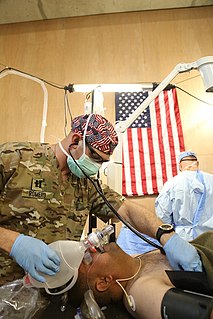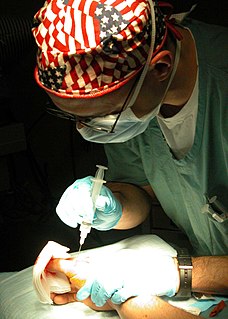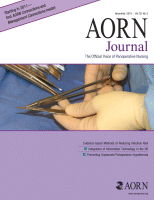
Anaesthesia is a state of controlled, temporary loss of sensation or awareness that is induced for medical purposes. It may include some or all of analgesia, paralysis, amnesia, and unconsciousness. A person under the effects of anesthetic drugs is referred to as being anesthetized.

A nurse anesthetist is an advanced practice nurse who administers anesthesia for surgery or other medical procedures. They are involved in the administration of anesthesia in a majority of countries, with varying levels of autonomy.

A Certified Registered Nurse Anesthetist (CRNA) is a specialized type of advanced practice nurse who administers anesthesia in the United States. CRNAs account for approximately half of the anesthesia providers in the United States and are the main providers of anesthesia in rural America. Historically, nurse anesthetists have been providing anesthesia care to patients since the American Civil War and the CRNA credential came into existence in 1956. CRNA schools issue a master's or doctorate degree to nurses who have completed a program in anesthesia, which ranges from 2–3 years in length.
Perioperative mortality has been defined as any death, regardless of cause, occurring within 30 days after surgery in or out of the hospital. Globally, 4.2 million people are estimated to die within 30 days of surgery each year. An important consideration in the decision to perform any surgical procedure is to weigh the benefits against the risks. Anesthesiologists and surgeons employ various methods in assessing whether a patient is in optimal condition from a medical standpoint prior to undertaking surgery, and various statistical tools are available. ASA score is the most well known of these.
An advanced practice nurse (APN) is a nurse with post-graduate education and training in nursing. Nurses practicing at this level may work in either a specialist or generalist capacity. APNs are prepared with advanced didactic and clinical education, knowledge, skills, and scope of practice in nursing.
The Doctor of Nursing Practice (DNP) is a degree in nursing. In the United States, the DNP is one of three doctorate degrees in nursing, the others being the PhD and the Doctor of Nursing Science. The curriculum for the DNP degree builds on traditional master's programs by providing education in evidence-based practice, quality improvement, and systems leadership, and is typically more clinically-oriented than PhD or DNS degrees. Advanced practice registered nurses (APRNs) include the nurse practitioner (NP), certified registered nurse anesthetist (CRNA), Certified Nurse‐Midwife (CNM), and the clinical nurse specialist (CNS) and are prepared in master's-degree programs. Although approximately 52% of nurse anesthetist programs will award the DNP, the remaining 48% may use the title doctor of nurse anesthesia practice (DNAP).
The perioperative period is the time period of a patient's surgical procedure. It commonly includes ward admission, anesthesia, surgery, and recovery. Perioperative may refer to the three phases of surgery: preoperative, intraoperative, and postoperative, though it is a term most often used for the first and third of these only - a term which is often specifically utilized to imply 'around' the time of the surgery. The primary concern of perioperative care is to provide better conditions for patients before operation and after operation.
In the United States, anesthesia can be administered by physician anesthesiologists, an anesthesiologist assistant, or nurse anesthetist.
Veterinary anesthesia is anesthesia performed on non-human animals by a veterinarian or a Registered Veterinary Technician. Anesthesia is used for a wider range of circumstances in animals than in people, due to animals' inability to cooperate with certain diagnostic or therapeutic procedures. Veterinary anesthesia includes anesthesia of the major species: dogs, cats, horses, cattle, sheep, goats, and pigs, as well as all other animals requiring veterinary care such as birds, pocket pets, and wildlife.
Divinyl ether is the organic compound with the formula O(CH=CH2)2. It is a colorless, volatile liquid that has mainly been of interest as an inhalation anesthetic. It is prepared by treating bis(chloroethyl) ether with base.

Nurses in Canada practise in a wide variety of settings, with various levels of training and experience. They provide evidence-based care and educate their patients about health and disease.

Alice Magaw (1860–1928) was an American nurse known for her work on anesthesia. Her innovations helped lead to major advances in modern surgery and earned her the title of the 'mother of anesthesia.'
Perianesthesia nursing is a nursing specialty practice area concerned with providing nursing care to patients undergoing or recovering from anesthesia. Perianesthesia nursing encompasses several subspecialty practice areas and represents a diverse number of practice environments and skill sets.
Perioperative nursing is a nursing specialty that works with patients who are having operative or other invasive procedures. Perioperative nurses work closely with surgeons, anaesthesiologists, nurse anaesthetists, surgical technologists, and nurse practitioners. They perform preoperative, intraoperative, and postoperative care primarily in the operating theatre.

The AORN Journal is a peer-reviewed nursing journal in the field of perioperative nursing and is the official journal of the Association of periOperative Registered Nurses (AORN).
Katharine Kolcaba is an American nursing theorist and nursing professor. Dr. Kolcaba is responsible for the Theory of Comfort, a broad-scope mid-range nursing theory commonly implemented throughout the nursing field up to the institutional level.
Hydrocodone/aspirin (INNs) is an oral combination drug formulation of the opioid analgesic hydrocodone and the nonsteroidal anti-inflammatory drug (NSAID) aspirin that is used in the treatment of chronic and acute pain. It is sold under brand names including Alor 5/500, Azdone, Damason-P, Lortab ASA, and Panasal 5/500.
Nursing educational programs in Iran are similar to the nursing educational programs in other countries in many aspects. Holding a secondary school diploma and passing the entrance exam is necessary for the admission. The entrance exams to governmental universities and Azad University are held separately. The duration of the associate degree course for operating room and anesthesia is two years, a bachelor's degree in nursing is four years, a master's degree in nursing is two to two and a half years, and a doctorate degree in nursing is four to five years.






